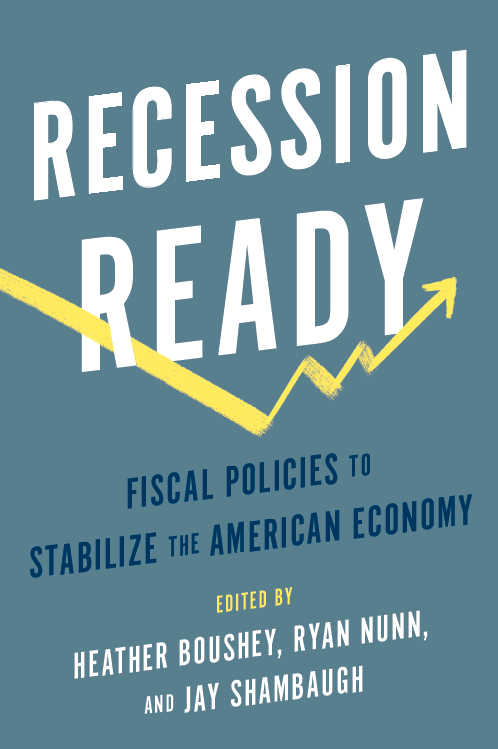Recession Ready

Economic recessions are inevitable and they are painful, with harsh short-term effects on families and businesses and potentially deep long-term impacts on the economy and society. But we can ameliorate some of the next recession’s worst effects and minimize its long-term costs if we adopt smart policies now that will be triggered when its first warning signs appear.
Equitable Growth has joined forces with The Hamilton Project to advance a set of specific, evidence-based policy ideas for shortening and easing the impacts of the next recession. In a new book, Recession Ready: Fiscal Policies to Stabilize the American Economy, experts from academia and the policy community propose six big ideas, including two entirely new initiatives and four significant improvements to existing programs, all to be triggered when the economy shows clear, proven signs of heading into a recession. These proposals (see more on each below) aim to strengthen and add to our automatic stabilizers: policies that inject money into the economy in a downturn and withdraw stimulus when the economy is strong. Congress should consider these policy proposals now because when the next recession appears on the horizon, it may be too late.
In addition to the book, Equitable Growth has prepared a summary of the report, and Equitable Growth’s Executive Director Heather Boushey spoke about the proposals with co-editor Jay Shambaugh on The Brookings Cafeteria podcast. For more on each proposal, please see links to the individual chapters and two-page summaries below:
- A proposal by Claudia Sahm of the Federal Reserve would boost consumer spending during recessions by creating a system of direct stimulus payments to individuals that would be automatically distributed when the unemployment rate increases rapidly. Full chapter and two-page summary.
- A proposal by Matthew Fiedler (Brookings Institution), Jason Furman (Harvard University), and Wilson Powell III (Harvard University) aims to avoid state budget cuts during recessions by increasing the federal matching rate for Medicaid and the Children’s Health Insurance Program during economic downturns. Full chapter and two-page summary.
- A proposal by Andrew Haughwout of the Federal Reserve Bank of New York aims to set up an automatic infrastructure investment program that would fund transportation projects at the state and local level during economic downturns. Full chapter and two-page summary.
- A proposal by Gabriel Chodorow-Reich of Harvard University and John Coglianese of the Federal Reserve Board aims to strengthen the automatic stabilization functions of the Unemployment Insurance system by increasing UI participation and payments during downturns, as well as strengthening Extended Benefits. Full chapter and two-page summary.
- A proposal by Indivar Dutta-Gupta of the Georgetown Center on Poverty and Inequality aims to set up a countercyclical stabilization program that would fund both job subsidies and basic assistance through the Temporary Assistance for Needy Families program. Full chapter and two-page summary.
- A proposal by Hilary Hoynes of the University of California, Berkeley and Diane Whitmore Schanzenbach of Northwestern University aims to strengthen the Supplemental Nutrition Assistance Program as an automatic stabilizer by limiting or eliminating SNAP work requirements and automatically increasing SNAP benefits during economic downturns. Full chapter and two-page summary.
